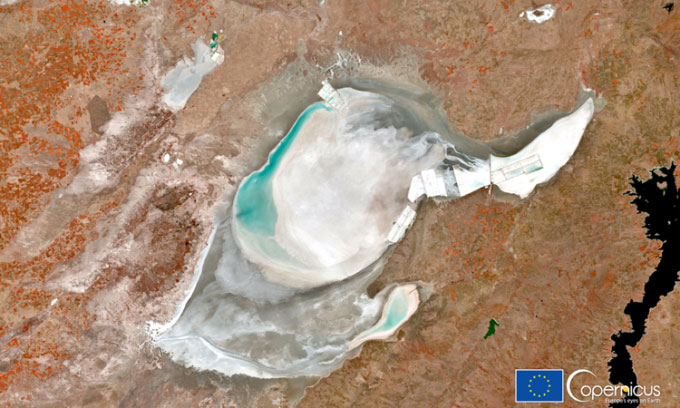Turkey's second largest lake disappears due to climate change
Salt Lake Tuz, which has an estimated 250 million tons of salt reserves, is drying up due to climate change and agricultural development.
An image taken by the European Space Agency's (ESA) Copernicus Sentinel-2 satellite on October 23 shows Lake Tuz drying up in just one year. What used to be Turkey's second largest lake is now just a giant salt field.
Tuz was once one of the largest saltwater lakes in the world. It usually swells and shrinks depending on the season. However, Lake Tuz is gradually shrinking over the years. The reason is that the amount of water flowing in is less and less due to the effects of climate change and agricultural development.

Satellite image of Lake Tuz, Turkey, October 23. (Photo: European Union/Copernicus Sentinel-2).
Tuz, like other saltwater lakes, is formed by a low-lying lake bed that traps inflows of water. This water carries salt and other minerals from rivers and streams. When the water evaporates, these substances are deposited in the lake. Tuz forms when rainwater and water from melting snow and ice pour into the lake each spring. The lake is only about 1 m deep on average. In the summer, large amounts of water evaporate, leaving behind a layer of salt 8 cm thick.
This amount of salt facilitates the development of the local salt mining industry. With an estimated salt reserve of 250 million tons, Tuz is one of the saltiest lakes on the planet with an estimated salt ratio of up to 32%. The lake provides 60% of the salt used in Turkey, the rest is exported to more than 60 countries.
To create salt, Lake Tuz needs to be replenished regularly. However, this lake is shrinking in recent years. This appears to be due to the dual effects of climate change and drought affecting water availability, as well as increased industrial and agricultural activity that diverts water flows before they reach the lake. A 2007 study found that Lake Tuz is only half the size it was 40 years ago.
Wildlife in the area is also greatly affected by this change. Lake Tuz provides important habitat for many species of birds. The local government estimates that this summer, about 1,000 young birds will die because of low water levels. Meanwhile, environmentalists say only 5,000 chicks have hatched, much less than in 2018 with 12,000.
Muazzez Celik Karakaya, a lecturer in natural sciences at Konya Technical University, said that Lake Tuz could disappear forever within 30 years if drastic action is not taken. "As water decreases due to global warming, the amount of salt crystallization will also decrease. This has negative consequences because there are more than 100 species of birds living in this area. If salt crystallization does not occur due to the amount of water. reduced, a layer of clay deposits will form on the lake surface, bringing in large amounts of dust and can lead to many respiratory diseases , " she said.
- China successfully saved the largest saltwater lake
- Poopó Lake 1000km2 wide suddenly disappeared
- Climate change 'heating' lakes on Earth
- Chinese desert freshwater lake gradually disappears
- The largest caribou in the world disappears almost half
- The lake is bubbling, burning in the Arctic
- The fourth largest lake in the world is about to disappear
- Discover the origin of the ancient lake under the desert
- Summary of UN special report on climate change: The Arctic as we know it is gone, believe your eyes
- This is how Dubai copes with climate change
- What is Climate Change?
- Mysterious about Lake Baikal - The largest lake in the world
 Is the magnetic North Pole shift dangerous to humanity?
Is the magnetic North Pole shift dangerous to humanity? Washington legalizes the recycling of human bodies into fertilizer
Washington legalizes the recycling of human bodies into fertilizer Lightning stone - the mysterious guest
Lightning stone - the mysterious guest Stunned by the mysterious sunset, strange appearance
Stunned by the mysterious sunset, strange appearance